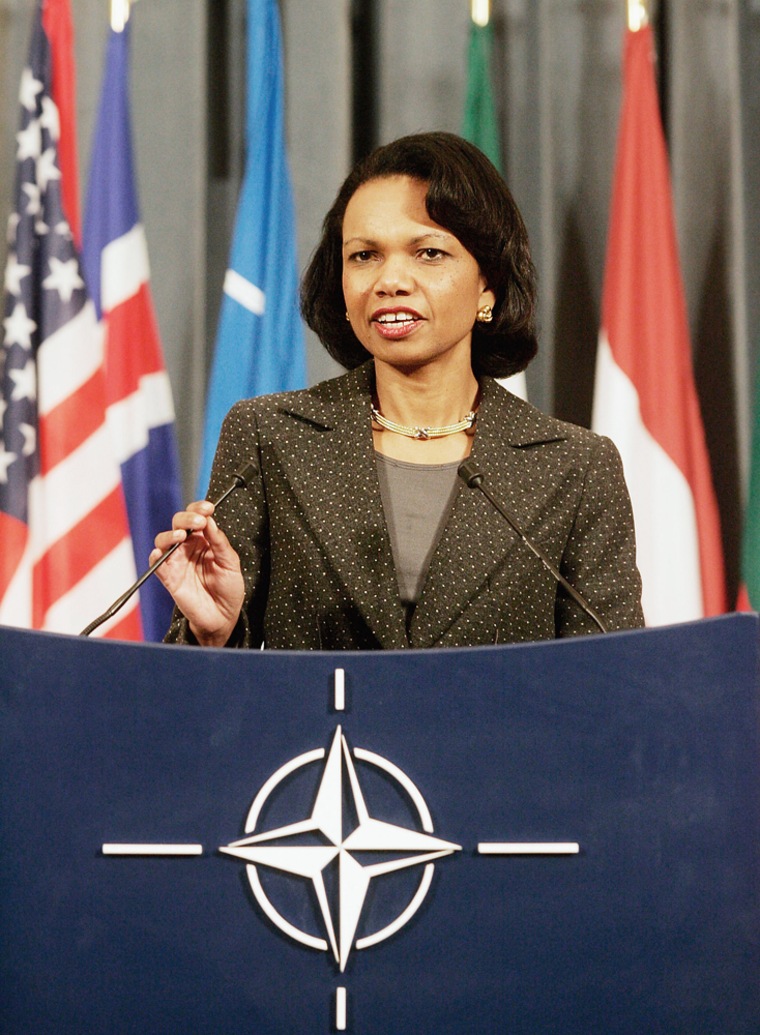BRUSSELS, Belgium —Answering questions atKiev University in the Ukraine this week, Secretary of State Condoleezza Rice couldn’t help but laugh when a student said he had once heard her described as the “Warrior Princess” and asked her if she thought it was an accurate description.
“It’s not how I think of myself,” Rice quickly replied. She then explained why she thought other people might see her that way. “It’s kind of a sense of, are you somebody who takes on challenges,” she said, “and answers in a kind of challenging way… I think that’s probably why.”
Although the origin of the nickname “Warrior Princess” is still in dispute — Rice recalled it was members of the press who came up with the name, while others said it was her staff — the description seemed to fit perfectly this week when she was forced to defend the Bush administration’s policies in the war on terror to skeptical European leaders and their citizens.
The question-and-answer session with the students was the only part of the week when Rice, former Stanford provost, looked to be truly enjoying herself.
In every other forum she was battered with questions about alleged secret CIA prisons in Europe, on the use of “renditions” and on U.S. policy on torture. In Berlin, Bucharest, Kiev and Brussels she could not manage to escape the glare.
Calm before the storm
For the traveling press corps, it was a “good story” to follow.
At 5:30 a.m. Monday morning, while boarding the vans that would take us to Andrews Air Force Base for departure, one of Rice’s aides handed out the five-page statement she would make prior to departure responding to the European Union inquiries on alleged CIA practices.
Eleven journalists — the first to lay eyes on the statement — were left in the predawn darkness trying to sort through the careful language, many of us wishing we had our own lawyers there to help us sort through the precise wording.
Rice entered the small media room at Andrews shortly after 7 a.m. In front of only one U.S. network “pool camera,” Rice said, “The United States does not authorize or condone torture of detainees,” that the U.S. “cannot discuss information that would compromise the success of intelligence, law enforcement, and military operations.”
She added that European countries have just as much at stake as the United States in the war on terror. “We share intelligence that has helped protect European countries from attack, helping save European lives.”
The room was subdued as she read the 12-minute statement and her voice was soft, even as she talked about terror, torture, and intelligence. Perhaps it was the early morning hour, or Rice’s desire to not animate the issue, but it was, as the cliché goes, truly the calm before the storm.
Barrage of questions
The very next morning in Berlin, Rice emerged from her private meeting with new German Chancellor Angela Merkel to face 27 television cameras, countless still photographers, and an audience full of anxious reporters. It was then when the week really began for the “Warrior Princess.”
At every stop Rice reiterated some version of “the United States is a country of laws” and does not torture. She warned Europeans that intelligence was crucial in stopping the “next attack.”
It was difficult to tell if her message was resonating. The newspaper headlines and television stories were focusing more on the fact that she was being hit hard by questions and the speculation that she had had signaled a shift in U.S. policy on torture after the remarks she made in the Ukraine.
So by Thursday morning, the press was anxious to hear about the private dinner Rice attended with NATO and European Union ministers. From all the attention paid to her trip and European concern about U.S. policy, it was reasonable to assume the dinner discussion had some potential for fireworks, or so we thought.
A senior U.S. official who did not attend the dinner but was briefed by Rice was sent to give reporters a read-out of the night.
The official called it a “constructive discussion” about a “genuine dilemma.” But the reporters in the room, always looking for a little color, wanted to know what foreign minister was the most vocal; were there any theatrics?
The official seemed pleased to report that there was “no posturing, fiery denunciations, table thumping, playing to the galleries or anything like that.”
Diplomacy at work
After a week from hell, Rice appeared to have been successful in easing tensions with her European colleagues. She took control of the dinner from the beginning by getting the issue of alleged CIA practices out on the table first, according to officials.
She said later, “I asked that we do that first … because I thought it was important that we have ample time to discuss and reassure and have a really extensive discussion of that issue.” Her strategy seemed to work.
The NATO Secretary General said she made a “strong intervention” and had “cleared the air.”
The Dutch foreign minister, a loud critic only the day before, said he was “very satisfied” by her presentation.
And Philipe Douste-Blazy, the French Foreign Minister, struck a positive tone, saying of the United States, “they are our friends, our allies, they are our partners.”
Rice said, “I appreciate the supportive comments that a number of colleagues have made.”
It was a rebound for her and perhaps proof to the Ukrainian student that she was a woman who when faced with challenges “answers in a kind of challenging way.”
